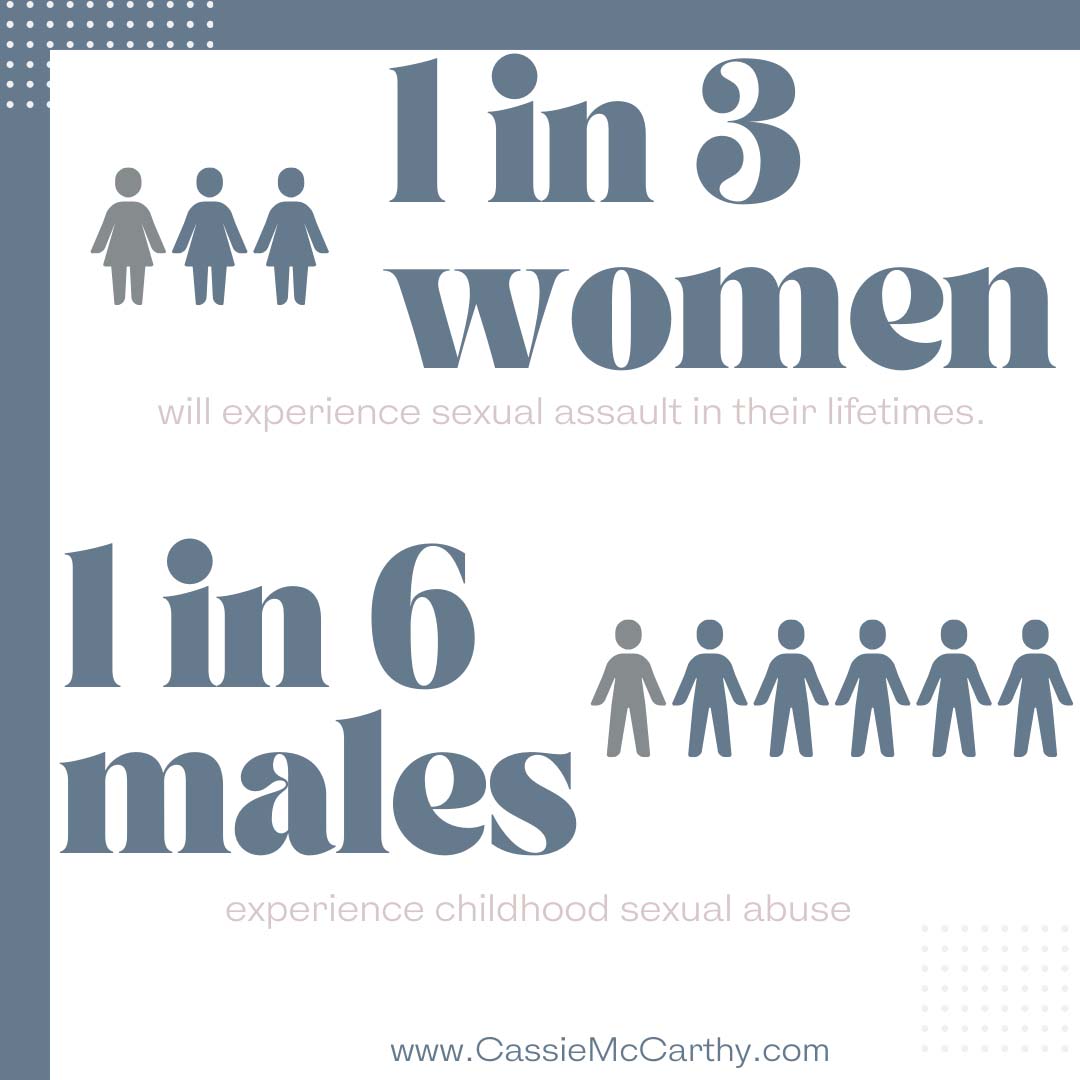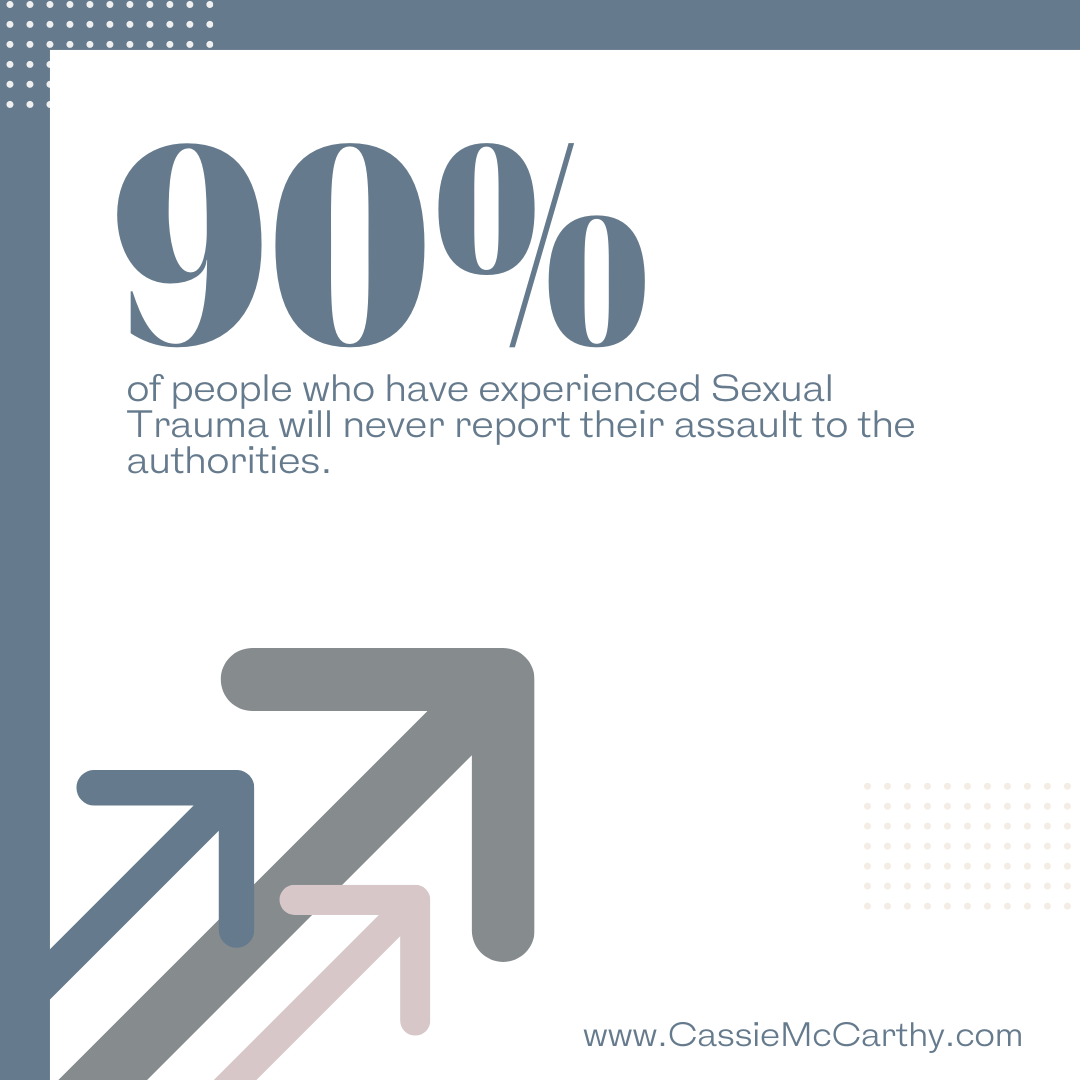What is Sexual Trauma?
In the U.S., 1 in 3 women will experience some form of sexual assault, yet many people don’t recognize their experiences as trauma. This is partly because our culture often normalizes harmful behaviors, leaving victims questioning whether what they went through was truly assault. But sexual trauma goes beyond the violent acts often depicted in the media. It can also involve coercion, manipulation, and breaches of trust.
In this post, we’ll explore the nuances of sexual trauma, its profound effects, and how trauma therapy can help you heal.
Sexual Trauma Defined
Sexual trauma is any form of sexual violation. It encompasses more than physical violence or force. It often involves violations of consent, boundaries, and trust, making it a complex and deeply personal experience.
Breaking Down the Different Types of Sexual Trauma
Sexual trauma doesn’t always look the way it’s portrayed on TV. You don’t need physical force for something to be traumatic. Here are the different forms it can take:
- Violent Sexual Assault: The type we often see in media—sexual acts involving force or violence, usually committed by a stranger.
- Coercion: This happens when someone is pressured, manipulated, or coerced into sexual acts. The pressure can be verbal, emotional, or based on power dynamics. You might feel like saying no isn’t an option because of the fear of social fallout, exclusion, or even retaliation.
- Sexual Acts Without Consent: Consent isn’t always explicitly asked for, and the person might be too afraid or frozen in fear to respond. This also includes situations where someone is too intoxicated to give their consent.
- Childhood Sexual Abuse: Any sexual act involving someone under the age of 14 is sexual violence. This is especially damaging when there’s a power gap or when the perpetrator is much older.
- Predatory Behavior: Grooming or manipulation by someone five or more years older is predatory, especially when the victim is under 25. Even in adulthood, power imbalances can make true consent difficult.
- Rape: This is a specific form of sexual assault where force, coercion, or manipulation is used to make someone engage in sexual acts against their will.
- Sexual Harassment: Unwanted sexual advances, comments, or behaviors that create an unsafe or uncomfortable environment. This often happens in the workplace or schools, where the pressure to keep quiet can feel overwhelming.
Understanding Consent in Sexual Trauma
A lot of people think that sexual trauma only happens when there’s explicit violence or when someone says “no” or “stop.” But that belief leaves out something critical—consent.
Here’s the thing about consent:
- Consent Must Be Requested: It’s not something that happens automatically. Consent needs to be clearly asked for—just like you would ask someone if they wanted something to eat before serving them. You don’t just assume.
- Consent Requires an Enthusiastic Yes: A hesitant “okay” isn’t the same as a “yes.” True consent means both people are equally enthusiastic. If one person feels pressured, it’s not real consent.
Consent Means a Real Choice: For consent to be real, both people have to feel free to say no. If one person holds power over the other, “no” may not feel like an option. True consent only happens when both parties feel safe to say yes or no, without fear or pressure.
When Your Assault Wasn’t Violent
What if your assault wasn’t violent—does that mean it wasn’t assault? Not at all. Violence isn’t the defining factor. If you didn’t consent, or didn’t want it, then it’s still assault.
Your brain is hardwired to protect you. When you face a threat, it quickly decides whether to fight, flee, or freeze. If the person is bigger or more capable of violence, your brain knows fighting might make things worse. If you can’t escape, you might freeze. And when you freeze, your body releases chemicals that make it hard to move, speak, or act.
So if you froze, that was your body’s way of protecting you. You might feel guilty for not saying or doing anything, but that’s only because you couldn’t. It wasn’t about choice—it was about survival.
And remember, consent doesn’t have to look like someone saying “no” or “stop.” Consensual sex requires a clear “yes.” If you didn’t give that, then it wasn’t consensual.
The Effects of Sexual Trauma
Sexual trauma leaves lasting scars that reach far beyond the actual incident. Here’s how it can show up in your life:
- Loss of Trust in Others: Since 90% of sexual trauma is committed by someone the victim knows, survivors often struggle to trust anyone afterward. It becomes hard to know who’s safe.
- Loss of Trust in Yourself: It’s not just about others—you may find it hard to trust your own judgment. After a trauma, survivors often doubt their instincts, feeling like they made poor decisions or should have known better.
- Shame: Society’s stigma around both sex and sexual assault can lead to a deep sense of shame. Many survivors feel “damaged” or “broken.” This shame is heavy and isolating.
- Changes in Sexual Behavior: Some survivors engage in more sexual activity or risky behavior as a way to cope, while others disconnect entirely. This can be an attempt to regain control or a response to feeling like their body no longer has value.
- PTSD Symptoms: Sexual trauma often triggers symptoms of PTSD, like:
- Flashbacks and intrusive thoughts
- Avoiding places or people that remind you of the trauma
- Emotional numbness or hyper-independence (feeling like you can only rely on yourself)
- Increased anxiety, irritability, or feeling constantly on edge
- Dissociation, where you feel detached from your body or question if what’s happening is real
If any of these symptoms feel familiar, it’s important to seek help from a trauma therapist.
How to Get Help for Sexual Trauma
If you’ve experienced sexual trauma, there are options for getting the help you need:
- Immediate Help: Rape Kits: Right after a sexual assault, you can go to the emergency department for a rape kit. It helps with medical care and evidence collection if you choose to report the assault, but not everyone does—and that’s okay.
- Delayed Help: It’s common to wait months or years before seeking help for sexual trauma. Whenever you’re ready, it’s the right time. There’s no timeline you have to follow.
- Finding a Trauma Therapist: Not every therapist is trained to handle trauma. Make sure to seek out a specialist trained in evidence-based trauma treatments like Cognitive Processing Therapy (CPT), Prolonged Exposure Therapy (PET), or Eye Movement Desensitization and Reprocessing Therapy (EMDR).
Where to Start Looking for a Trauma Therapist
- Insurance Panels: Many therapists who specialize don’t work directly with insurance providers. But if it’s important to you to go through your insurer, you will need to contact your insurance provider and ask that they send you a list of therapists trained in Cognitive Processing Therapy, Prolonged Exposure Therapy or Eye Movement Desensitization and Reprocessing. If they don’t have a lot of options, ask them about your Out of Network options.
- Referrals: Ask your current therapist, physician, or friends who’ve gone through trauma therapy for recommendations.
- Google: Search for “trauma therapist near me” to narrow your options.
- Psychology Today: Use this platform to filter for therapists who offer specific trauma treatments, such as EMDR or CPT.
Start Your Healing Journey Today
Sexual trauma can deeply affect your trust in others and yourself. But healing is possible. Trauma therapy offers a structured, research-backed way to recover from trauma, helping you regain control over your emotions, body, and future.
You don’t have to go through this alone. If any of these symptoms resonate with you, it might be time to take the next step. Trauma therapy can help you reclaim your life and heal from the past.
If you live in Massachusetts, Vermont, Virginia, Florida, or Illinois, you can reach out to me to schedule a free consultation today to find out how trauma therapy can support your recovery.
FAQ: Your Questions About Sexual Trauma
Click or tap any question to see the answer. Click or tap again to close.
Does sexual trauma always involve violence?
No. Sexual trauma doesn’t need to involve physical violence to be considered assault. If there was no consent, or you froze and couldn’t respond, it’s still sexual assault.
Can I experience sexual trauma even if I didn’t say “no”?
Yes. Consent requires an enthusiastic “yes,” not just the absence of a “no.” If you didn’t give clear, active consent, that’s not consensual sex.
What should I do if I froze during my assault and didn’t fight back?
Freezing is a natural survival response. Your body and brain were protecting you by making it impossible to act. You didn’t fail—you survived. Trauma therapy can help you process this and heal.
Can sexual trauma impact my relationships and trust?
Absolutely. Sexual trauma often affects trust in others and yourself. Many survivors struggle to build safe, trusting relationships afterward. Trauma therapy can help rebuild that trust and restore your sense of safety.
How can trauma therapy help me recover?
Trauma therapy provides you with evidence-based tools and techniques to process what happened, manage symptoms, and heal. Therapies like CPT, PET, and EMDR are specifically designed to treat trauma and PTSD, helping you regain control over your life.



